ISLAMABAD: The government has constituted a ‘National Ulema and Mashaikh Council’.
The federal minister for religious affairs will be chairman of the council and the minister of state, the religious affairs secretary, ministers for religious affairs of four provinces, Gilgit-Baltistan and Azad Kashmir and 38 clerics and religious scholars will be its members.
The ministry issued a notification about establishment of the council on April 21, but most of its members are still not aware about it.
Even Mufti Muneebur Rehman, who is chief of Ittehad Tanzimat-i-Madaris Pakistan, has not any knowledge about the development. “These are political stunts and nothing of any value. It may be another women protection bill,” he said.
Maulana Yasin Zafar of Wafaqul Madaris Al Salfia (Ahle Hadees) also did not know anything about the council. “I do not know the reasons for establishment of the council and its responsibilities.”
Allama Arif Wahidi, a member of the council from Punjab, said it might be an official version of the Milli Yekjehti Council to evolve consensus among different sects.
Members of the council are from mainstream boards of religious seminaries belonging to Barelvi, Shia, Deobandi and Ahle Hadees schools of thought and madressahs affiliated with the Jamaat-i-Islami.
Qari Hanif Jalandhari (Deobandi), Mufti Muneebur Rehman (Barelvi), Maulana Yasin Zafar (Ahle Hadees), Allama Niaz Hussani Naqvi (Ahle Tashee) and Maulana Abdul Maalik (Jamaat-i-Islami) are members of the council.
Maulana Haroon Rasheed (Deobandi) and Mufti Mohammad Khateeb (Barelvi), Maulana Abdul Aziz Hanif (Ahle Hadees) and Allama Amin Shaheedi (Ahle Tashee) are members of the council from Islamabad belonging to the category of Mashaikh.
Maulana Asad Obaid and Allama Zhid Qasmi (Deobandi), Maulana Raghib Naeemi (Barelvi), Allama Zahid Rashadi (religious scholar), Prof Sajid Mir (Ahle Hadees) and Allama Arif Wahidi (Ahle Tashee) are members of the council from Punjab.
Shah Awais Noorani and three other members are from Sindh.
There are four members each belonging to Barelvi, Deobandi, Ahle Hadees and Alhe Tashee sects from Gilgit-Baltistan and Balochistan and six from Khyber Pakhtunkhwa as it has two members from Barelvi school of thought and a religious scholar.
Published in Dawn, April 28th, 2016












































